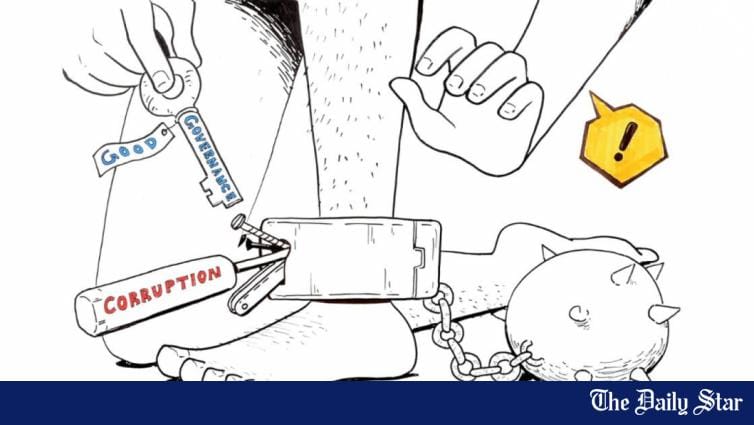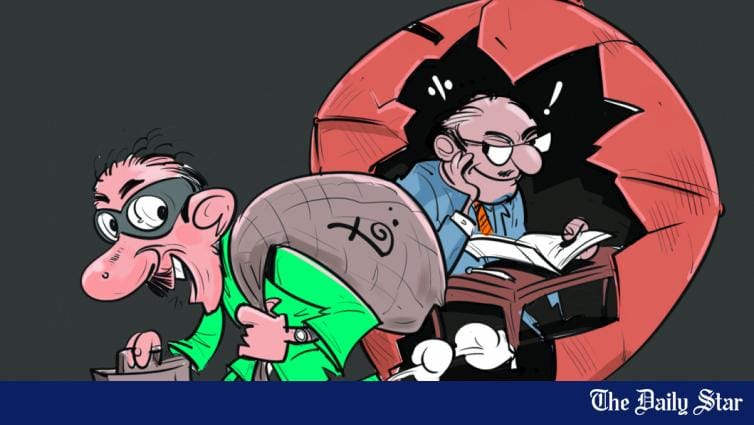Saif
Senior Member
- Messages
- 15,397
- Nation

- Axis Group


Tk 500 million deposited in bank accounts of Faisal’s 14 relatives
Around Tk 500m was deposited in bank and other financial institution accounts of NBR’s former secretary Quazi Abu Mahmud Faisal and his 14 relatives
Tk 500 million deposited in bank accounts of Faisal's 14 relatives
AsaduzzamanDhaka
Updated: 08 Jul 2024, 15: 41

Quazi Abu Mahmud Faisal Official photo
Around Tk 500 million was deposited in bank and other financial institutions' accounts of National Board of Revenue's former first secretary Quazi Abu Mahmud Faisal and his 14 relatives in the last eight years.
The relatives include Faisal's mother, brother, sister, sister-in-law, wife and in-laws.
According to an investigation of the Anti-Corruption Commission (ACC), the amount was deposited (including investment at savings certificates) between 2016 and 2023. Besides, flats, plots and land worth Tk 210 million (as shown in deeds) were bought in the names of Faisal and his relatives. None of the relatives of Faisal are involved with any large business. They neither do any jobs in high posts in government or private jobs.
Faisal's mother, sister, mother-in-law, sister of mother-in-law are housewives. Of the relatives, Faisal's brother-in-law Syed Abdullah is a police inspector. He was officer in charge of Mothbaria police station in Pirojpur and is now attached with Feni police lines. Faisal's brother is a lawyer.
An official of ACC said the information of NBR official Faisal's huge wealth was leaked mainly during the investigation of his brother in law Abdullah's wealth. Abdullah allegedly amassed huge wealth while he was OC of Mothbaria police station. Later, an investigation committee consisting of three ACC officials of Pirojpur was formed in February last year to investigate police officer Abdullah's wealth.
Syed Abdullah was the OC in the police station between 29 March in 2019 and 24 March in 2020.
The ACC official said the probe body primarily learnt about the huge wealth of Abdullah during the investigation. The ACC later in May last year got information that Abdullah's wife Farhana Akhter (Faisal's sister) owns two flats and a commercial space in Dhaka, mother-in-law Karima Khatun owns a flat in Gulshan. Also, the ACC investigators traced millions of taka transactions in the bank accounts of Faisal's sister. The ACC applied to the court for confiscation and attachment of wealth amassed in the names of Faisal's sister, mother and brother-in-law. The court on 28 May last year ordered confiscation of the movable and immovable properties of them worth Tk 180 million.
After 11 months of the order, ACC submitted the wealth lists of Faisal and his 10 relatives to the court. Based on this, Dhaka metropolitan senior special judge Mohammad As Shams Jaglul Hossain directed to confiscate properties of Faisal and his 11 relatives on 27 June. During the court order, Faisal was the first secretary of NBR Dhaka office (tax). He was later 'released' from the NBR and transferred to Bogura tax zone.
The ACC in its report to the court said Faisal amassed huge amounts of wealth through misuse of power and corruption including transfer of income tax officials in exchange of money and intimidating the taxpayers.
Prothom Alo tried to contact Quazi Faisal several times in the last seven days for his comment on an allegation of amassing illegal wealth. But he did not respond to calls.
The ACC in its report to the court said Faisal amassed huge amounts of wealth through misuse of power and corruption including transfer of income tax officials in exchange of money and intimidating the taxpayers.
The ACC report also made similar observations about Faisal's brother-in-law Syed Abdullah in a separate report submitted to the court. The report said Abdullah amassed huge wealth by restoring to corruption including misuse of power and relations with drug traders.
Prothom Alo tried to contact Syed Abdullah also. He received the call only once, and after knowing the identity of this journalist, he hung up the phone saying he cannot talk now.
Properties of Faisal's mother-sister
ACC investigation finds that most of the wealth of police official Abdullah is in the names of his wife and mother-in-law. Both of them are housewives.
According to the court order on confiscation of wealth, Abdullah's wife Farhana has saving certificates worth Tk 10 million. She has nine bank accounts in her name, of which six were opened in 2021-2022. A total of Tk 10 million was deposited in an account opened in 2021. A total of Tk 17.6 million was deposited in her nine bank accounts. Besides, Farhana owns a 2386-square feet commercial space in a building in Kakrail worth Tk 27 million. She also has a Tk 20 million flat in Moghbazar and Tk four million flat in Khilgaon. Faisal's mother Karima Khatun has a Tk 88.3 million flat in the city's Gulshan.
Faisal's brother-in-law Abdullah has a 12-katha plot at Ananda Police Housing Limited in Narayanganj's Rupganj.
Wealth of Faisal and other relatives
According to the ACC investigation, Faisal's properties are mainly in the names of his wife Afsana Naznin, father-in-law Ahammed Ali and mother-in-law Momtaz Begum. He bought plots in Dhaka and Narayanganj in his own name. He has six bank accounts. A total of Tk 52.1 million was deposited in these accounts from 216 to 2023.
Faisal's wife has savings certificates worth Tk five million. Besides, there are five bank accounts in her name. A total of Tk 22.5 million was deposited in these accounts opened between 2016 and 2023. Besides, a total of 10 katha plots in Dhaka and Rupganj were bought in his name.
Meanwhile, another 10 katha plot was bought in the name of Faisal's mother-in-law in Dhaka in 2022. Although the price of the land was shown Tk 5.2 million in deeds, the ACC told the court that the land is actually worth Tk 45 million. Besides, over Tk 60 million was deposited in eight bank accounts opened in her name between 2016 and 2023.
According to ACC investigation, a flat worth Tk 10 million was bought in the name of Faisal's father-in-law Ahammed Ali (retired bank officer) last year. Besides , savings certificates worth Tk 3 million were bought in his name in 2020-2021. The ACC investigation finds that Tk 110 million was deposited in eight bank accounts in his name. Savings certificates worth Tk 3 million were bought in the name of Faisal's brother-in-law Aftab Ali in 2020 and 2021. Five bank accounts were opened in his name between 2016 and 2023 where Tk 14 million was deposited.
ACC investigation finds that Savings Certificates worth Tk 3 million were bought in the name of Faisal's brother Quazi Khalid Hasan in 2021. A total of Tk 21.2 million was deposited in his six bank accounts in 2021-2023. A total of Tk 17.1 million was deposited in two accounts Sheikh Nasir Uddin, maternal uncle-in-law of Faisal, in 2021-2022. Besides, Tk 37.6 million was deposited in a bank account of Mahmuda Hasan, Faisal's maternal aunt-in-law, in 2021. Tk 12.1 million was deposited in four bank accounts of Farhana Afroze, Mahmuda's daughter.
According to the ACC report submitted to the court, saving certificates worth Tk 4 million were bought in the name of Khandakar Hafizur Rahman, an acquaintance of Faisal, in 2021. Besides, Tk 137.2 million was deposited in five bank accounts in his name between 2019 and 2021.
Transparency International, Bangladesh's executive director Iftekharuzzaman told Prothom Alo that it is not possible for anyone to amass such a large amount of money legally. A section of corrupt officials have become wealthy due to lack of transparency and accountability.
Hafizur is from Boyra area in Khulna city. A visit to his house in Khulna on 25 June revealed that Hafizur has a one storied building. Hafizur's wife Rizia Begum told Prothom Alo that her husband is a seasonal paddy trader. He cannot renovate his house for want of money. Rainwater seeps into their house.
Asked about his relations with Faisal, Rizia said they are not relatives but Faisal's father is a family friend.
According to the ACC investigation report, a total of Tk 84.5 million was deposited in two bank accounts in the name of Faisal's relative Rowshan Ara Khatun. The bank accounts were opened in 2019 and 2020.
Transparency International, Bangladesh's executive director Iftekharuzzaman told Prothom Alo that it is not possible for anyone to amass such a large amount of money legally. A section of corrupt officials have become wealthy due to lack of transparency and accountability. The government should see the wealth statement of public servants and take strict actions against those who have ill-gotten money.
AsaduzzamanDhaka
Updated: 08 Jul 2024, 15: 41
Quazi Abu Mahmud Faisal Official photo
Around Tk 500 million was deposited in bank and other financial institutions' accounts of National Board of Revenue's former first secretary Quazi Abu Mahmud Faisal and his 14 relatives in the last eight years.
The relatives include Faisal's mother, brother, sister, sister-in-law, wife and in-laws.
According to an investigation of the Anti-Corruption Commission (ACC), the amount was deposited (including investment at savings certificates) between 2016 and 2023. Besides, flats, plots and land worth Tk 210 million (as shown in deeds) were bought in the names of Faisal and his relatives. None of the relatives of Faisal are involved with any large business. They neither do any jobs in high posts in government or private jobs.
Faisal's mother, sister, mother-in-law, sister of mother-in-law are housewives. Of the relatives, Faisal's brother-in-law Syed Abdullah is a police inspector. He was officer in charge of Mothbaria police station in Pirojpur and is now attached with Feni police lines. Faisal's brother is a lawyer.
An official of ACC said the information of NBR official Faisal's huge wealth was leaked mainly during the investigation of his brother in law Abdullah's wealth. Abdullah allegedly amassed huge wealth while he was OC of Mothbaria police station. Later, an investigation committee consisting of three ACC officials of Pirojpur was formed in February last year to investigate police officer Abdullah's wealth.
Syed Abdullah was the OC in the police station between 29 March in 2019 and 24 March in 2020.
The ACC official said the probe body primarily learnt about the huge wealth of Abdullah during the investigation. The ACC later in May last year got information that Abdullah's wife Farhana Akhter (Faisal's sister) owns two flats and a commercial space in Dhaka, mother-in-law Karima Khatun owns a flat in Gulshan. Also, the ACC investigators traced millions of taka transactions in the bank accounts of Faisal's sister. The ACC applied to the court for confiscation and attachment of wealth amassed in the names of Faisal's sister, mother and brother-in-law. The court on 28 May last year ordered confiscation of the movable and immovable properties of them worth Tk 180 million.
After 11 months of the order, ACC submitted the wealth lists of Faisal and his 10 relatives to the court. Based on this, Dhaka metropolitan senior special judge Mohammad As Shams Jaglul Hossain directed to confiscate properties of Faisal and his 11 relatives on 27 June. During the court order, Faisal was the first secretary of NBR Dhaka office (tax). He was later 'released' from the NBR and transferred to Bogura tax zone.
The ACC in its report to the court said Faisal amassed huge amounts of wealth through misuse of power and corruption including transfer of income tax officials in exchange of money and intimidating the taxpayers.
Prothom Alo tried to contact Quazi Faisal several times in the last seven days for his comment on an allegation of amassing illegal wealth. But he did not respond to calls.
The ACC in its report to the court said Faisal amassed huge amounts of wealth through misuse of power and corruption including transfer of income tax officials in exchange of money and intimidating the taxpayers.
The ACC report also made similar observations about Faisal's brother-in-law Syed Abdullah in a separate report submitted to the court. The report said Abdullah amassed huge wealth by restoring to corruption including misuse of power and relations with drug traders.
Prothom Alo tried to contact Syed Abdullah also. He received the call only once, and after knowing the identity of this journalist, he hung up the phone saying he cannot talk now.
Properties of Faisal's mother-sister
ACC investigation finds that most of the wealth of police official Abdullah is in the names of his wife and mother-in-law. Both of them are housewives.
According to the court order on confiscation of wealth, Abdullah's wife Farhana has saving certificates worth Tk 10 million. She has nine bank accounts in her name, of which six were opened in 2021-2022. A total of Tk 10 million was deposited in an account opened in 2021. A total of Tk 17.6 million was deposited in her nine bank accounts. Besides, Farhana owns a 2386-square feet commercial space in a building in Kakrail worth Tk 27 million. She also has a Tk 20 million flat in Moghbazar and Tk four million flat in Khilgaon. Faisal's mother Karima Khatun has a Tk 88.3 million flat in the city's Gulshan.
Faisal's brother-in-law Abdullah has a 12-katha plot at Ananda Police Housing Limited in Narayanganj's Rupganj.
Wealth of Faisal and other relatives
According to the ACC investigation, Faisal's properties are mainly in the names of his wife Afsana Naznin, father-in-law Ahammed Ali and mother-in-law Momtaz Begum. He bought plots in Dhaka and Narayanganj in his own name. He has six bank accounts. A total of Tk 52.1 million was deposited in these accounts from 216 to 2023.
Faisal's wife has savings certificates worth Tk five million. Besides, there are five bank accounts in her name. A total of Tk 22.5 million was deposited in these accounts opened between 2016 and 2023. Besides, a total of 10 katha plots in Dhaka and Rupganj were bought in his name.
Meanwhile, another 10 katha plot was bought in the name of Faisal's mother-in-law in Dhaka in 2022. Although the price of the land was shown Tk 5.2 million in deeds, the ACC told the court that the land is actually worth Tk 45 million. Besides, over Tk 60 million was deposited in eight bank accounts opened in her name between 2016 and 2023.
According to ACC investigation, a flat worth Tk 10 million was bought in the name of Faisal's father-in-law Ahammed Ali (retired bank officer) last year. Besides , savings certificates worth Tk 3 million were bought in his name in 2020-2021. The ACC investigation finds that Tk 110 million was deposited in eight bank accounts in his name. Savings certificates worth Tk 3 million were bought in the name of Faisal's brother-in-law Aftab Ali in 2020 and 2021. Five bank accounts were opened in his name between 2016 and 2023 where Tk 14 million was deposited.
ACC investigation finds that Savings Certificates worth Tk 3 million were bought in the name of Faisal's brother Quazi Khalid Hasan in 2021. A total of Tk 21.2 million was deposited in his six bank accounts in 2021-2023. A total of Tk 17.1 million was deposited in two accounts Sheikh Nasir Uddin, maternal uncle-in-law of Faisal, in 2021-2022. Besides, Tk 37.6 million was deposited in a bank account of Mahmuda Hasan, Faisal's maternal aunt-in-law, in 2021. Tk 12.1 million was deposited in four bank accounts of Farhana Afroze, Mahmuda's daughter.
According to the ACC report submitted to the court, saving certificates worth Tk 4 million were bought in the name of Khandakar Hafizur Rahman, an acquaintance of Faisal, in 2021. Besides, Tk 137.2 million was deposited in five bank accounts in his name between 2019 and 2021.
Transparency International, Bangladesh's executive director Iftekharuzzaman told Prothom Alo that it is not possible for anyone to amass such a large amount of money legally. A section of corrupt officials have become wealthy due to lack of transparency and accountability.
Hafizur is from Boyra area in Khulna city. A visit to his house in Khulna on 25 June revealed that Hafizur has a one storied building. Hafizur's wife Rizia Begum told Prothom Alo that her husband is a seasonal paddy trader. He cannot renovate his house for want of money. Rainwater seeps into their house.
Asked about his relations with Faisal, Rizia said they are not relatives but Faisal's father is a family friend.
According to the ACC investigation report, a total of Tk 84.5 million was deposited in two bank accounts in the name of Faisal's relative Rowshan Ara Khatun. The bank accounts were opened in 2019 and 2020.
Transparency International, Bangladesh's executive director Iftekharuzzaman told Prothom Alo that it is not possible for anyone to amass such a large amount of money legally. A section of corrupt officials have become wealthy due to lack of transparency and accountability. The government should see the wealth statement of public servants and take strict actions against those who have ill-gotten money.





